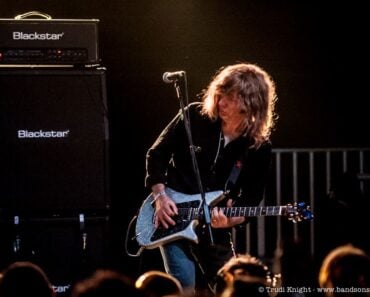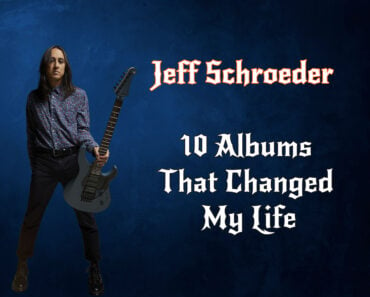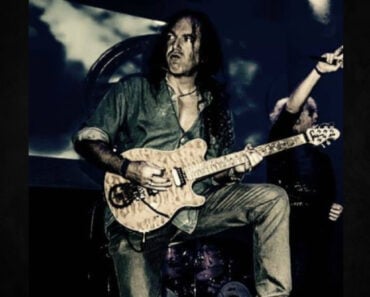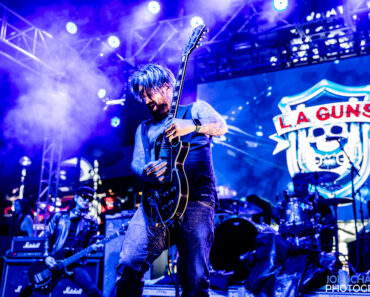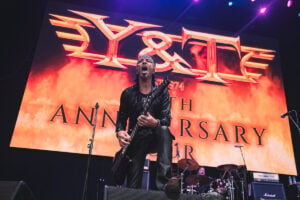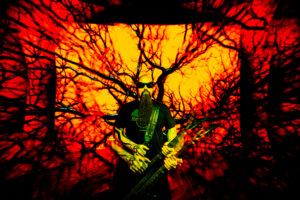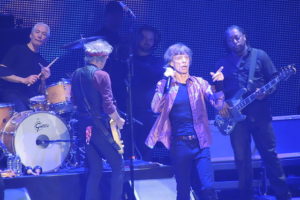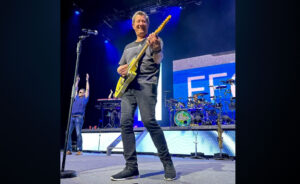
Feature Photo courtesy of Tony Obrohta
When Tony Obrohta was thirteen and just learning to play guitar, if someone had said, “Playing music will take you worldwide, and you’ll do it with legendary classic rockers, Chicago,” he never would have believed it.
But the fact remains that Obrohta’s dream became a reality, and his life truly has been one of blessings via six-string. Of course, he knows he’s lucky to be part of a rich tapestry that was once woven by the great Terry Kath but make no mistake— Obrohta brings a whole hell of a lot to the table.
With a bachelor’s degree in music and over thirty years in the biz, which has seen him ride buses, board planes, and take up temporary residence in dressing and hotel rooms, to be sure, Obrohta knows his way around a stage and studio.
For Tony Obrohta, there’s no better feeling than taking his musical message to the masses, but he remains humble. To that end, Obrohta dialed in with ClassicRockHistory.com to recount the ten albums that changed his life.
# 10 – The Legend of Jesse James by Various Artists (1980)
This album shaped my view of country music and ended up being the reason I moved to Nashville. This is nominally a country album produced by Glyn Johns, but it sounds more like The Who than Waylon Jennings. It’s a masterful bit of songwriting telling the story of Jesse James, sung by some of the biggest names in country music at the time (Charlie Daniels, Emmylou Harris, Johnny Cash), with both drumming and the voice of Jesse performed by none other than Levon Helm.
Guitarist Jesse Ed Davis, who is an absolute monster on this record with his gritty wah tones, brings the perfect amount of outlaw to the songs with his biting tones. The acoustic guitars played by Paul Kennerley and Bernie Leadon on this record are also spot-on-perfect. Albert Lee, one of the ultimate chicken pickers, also contributes electricity, as only Albert can. This is one of those albums I’ve always wished I could have played on—a true unsung gem of an album.
# 9 – OK Computer by Radiohead (1997)
I was late to the Radiohead party. I remember bringing home OK Computer and hearing the opening riff to “Airbag.” I stopped, staring at my speakers in disbelief. This music was something totally new. Johnny [Greenwood] and Ed [O’Brien] are the Keith [Richards] and Ronnie [Wood] for a new generation with a completely unique approach to guitar playing. I love how they are two totally different players with their own approach.
Whether it’s through Ed’s atmospheric effects or the sheer brute force of Johnny’s atonal mashings, they each contribute to the song, so it transcends mere guitar playing and becomes a tapestry for Thom’s vocal melody. I saw the In Rainbows tour, and they were even better live than in the studio, more willing to take risks and pull everything off with complete conviction and superiority.
# 8 – Electric Ladyland by Jimi Hendrix (1968)
A guitar underwater, a guitar on fire, a guitar that sounds like it’s coming at you from Neptune. Jimi really was otherworldly, and every guitar player in any genre can pull something to emulate from his playing. You can get close to figuring out some players, but Jimi seems to have that one thing that makes him untouchable to the rest of us mere mortals.
# 7 – Diver Down by Van Halen (1982)
One day, my brother brought home an eight-track with “Eruption” on it, and I couldn’t believe what I was hearing. That compelled me to purchase Diver Down immediately since it had just been released, and I needed more Van Halen. A friend and I were headed to the baseball field, and I popped the tape into my Walkman. I had to ride on my friend’s handlebars, and the whole way there, I was transfixed by the way that Eddie was reinventing the guitar.
So much so that I didn’t pay attention when we stopped at the ballpark until I looked over and realized that my friend was standing next to me; I’d been so engrossed in the music that I was balancing on the handlebars with nobody holding the bike up! As soon as I realized it, I came crashing into a heap on the ground, but Eddie and I were almost levitating for a few seconds. Eddie is the Mozart of modern electric guitar, a genius never to be duplicated.
# 6 – But Seriously, Folks by Joe Walsh (1978)
Growing up in the Midwest and learning to play guitar, Joe Walsh was a constant in my life. He never seemed to play a wrong note and had perfect tones for every song he played. The songs on this record are the perfect vehicle for Joe to show off all his talents – from exquisite rhythm playing, cool layering, and lyrical slide playing.
All it takes is one listen to “Theme from Boat Weirdos” to understand – that pick slide towards the song’s end sounds like a long clap of thunder. You hear every note Joe plays; it’s articulate, and the bends are perfect. I can put this album on and still feel the warm summer air of rural Illinois at dusk, with the crickets just starting up for the evening.
# 5 – Tattoo You by The Rolling Stones (1981)
When I was four years old, my uncle let me borrow his Hot Rocks record because I liked how the cover looked. I took it home and played it on my little toy record player, and the sounds that came out scared the hell out of me, but I kept listening to it because I knew in some way that I liked it. Every Stones song to me sounds like a knife fight is getting ready to break out, especially on Tattoo You.
Keith and Ronnie are weaving at their slinky best. Keith drives every song like a freight train while Ronnie slips and slides around him. Tandem guitar playing is hard because you want to be playing in a different register than the other person is playing, and these two wrote the book on how to stay out of each other’s way while still seeming to sound like one guitar player.
# 4 – Waiting for Columbus by Little Feat (1977)
I would have bet a million dollars that Little Feat was some band from New Orleans or Texas, not the brainstorm of a former member of Frank Zappa’s band. The music was so funky, and the slide playing incredibly. When I thought of slide playing, I typically recalled Muddy Waters, but Lowell George seemed to make his lines an extension of his vocals.
I dove in headfirst, trying to unlock the secrets of his playing, and even went so far as to have my dad use a hacksaw to remove the top part of a socket wrench so I could have a slide just like his. I still have the slide, and I still use it. I love the compressed squeeze of his notes and the subtle vibrato of his playing.
# 3 – Shadows and Light by Joni Mitchell (1980)
In college, I was knee-deep in learning Bach cello suits and the finer points of soloing over jazz chord changes. I didn’t want to be Segovia; I wanted to be a rocker, so the thought process for jazz and the required skill set was more challenging than what I’d been doing previously. I was turned on to this album, and it was instant inspiration. I wasn’t familiar with Joni before this – but I knew about Pat Metheny, Lyle Mays, and Jaco Pastorius.
When I heard them taking Joni’s songs firmly into the jazz world with her array of open tunings, it made everything I was studying in school finally make sense. Hearing the practical application of jazz over Joni’s songs, I began to see how every aspect of being a well-rounded player was equally important. Joni’s absolute mastery of open tunings and percussive playing led me back to Zeppelin and Page’s open-tuning acoustic work. Open tunings are a love affair that continues for me to this day.
# 2 – The Song Remains the Same by Led Zeppelin (1973)
Jimmy Page is relentless on this album. His tone is huge and powerful, yet still almost clean. This is the benchmark of a live guitar sound. I love live albums because you get to hear the spur-of-the-moment interplay between band members, and with Zeppelin, you were never going to hear the same thing night after night. The guitar solo in “No Quarter” alone makes this one of my all-time favorite albums.
# 1 – Quadrophenia by The Who (1973)
This is my quintessential rock guitar album – give a young Pete Townshend an acoustic guitar and an idea and get out of his way. The sharp, slashing Gretsch 6120 guitar chords full of angst in “The Punk and the Godfather” are juxtaposed with the clean, bell-like guitar lines in “Quadrophenia.”
Pete’s playing pushes the rest of the band to convey the emotional feeling of the songs further; it all comes down to the physicality of his playing. He uses his guitar as the ultimate vehicle of personal expression, and it’s his most honest playing on this album.
Tony Obrohta of Chicago: 10 Albums That Changed My Life article published on Classic RockHistory.com© 2023
Classicrockhistory.com claims ownership of all its original content and Intellectual property under United States Copyright laws and those of all other foreign countries. No one person, business, or organization is allowed to re-publish any of our original content anywhere on the web or in print without our permission. All photos used are either supplied by the artists, public domain Creative Commons photos, or licensed officially from Shutterstock under license with ClassicRockHistory.com.


